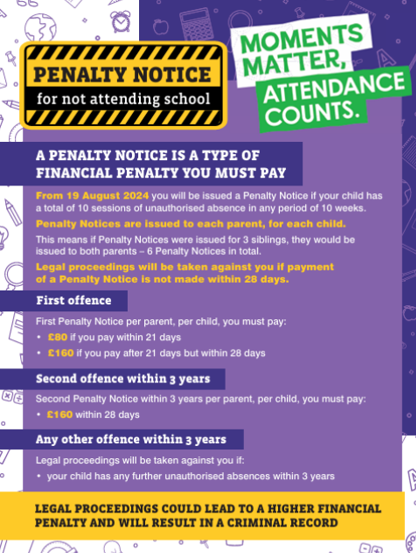Attendance
Holt Farm Infant School recognises that positive behaviour and good attendance are essential in order for pupils to get the most of their school experience, including their attainment, wellbeing and wider life chances.
The law entitles every child of compulsory school age to an efficient, full-time education suitable to their age, aptitude, and any special educational need they may have. It is the legal responsibility of every parent to make sure their child receives that education either by attendance at a school or by education otherwise than at a school.
Where parents decide to have their child registered at school, they have an additional legal duty to ensure their child attends that school regularly, on time. This means their child must attend every day that the school is open, except in a small number of allowable circumstances such as being too ill to attend or being given permission for an absence in advance from the school.
The Department for Education (DfE) has produced statutory guidance for maintained schools, academies, independent schools, and local authorities. It is called “Working together to improve school attendance” and it includes a National Framework in relation to absence and the use of legal sanctions. Our School Attendance Policy reflects the requirements and principles of that guidance.
This policy is written with the above guidance in mind and underpins our school ethos to:
- promote children’s welfare and safeguarding;
- ensure every pupil has access to the full-time education to which they are entitled;
- ensure that pupils succeed whilst at school;
- ensure that pupils have access to the widest possible range of opportunities at school, and when they leave school.
It has been developed in consultation with school governors, teachers, local Headteacher Associations, the Local Authority and parents and carers. It seeks to ensure that all parties involved in the practicalities of school attendance are aware and informed of attendance matters in school and to outline the school’s commitment to attendance matters. It details the responsibilities of individuals and groups involved and the procedures in place to promote and monitor pupil attendance.
Promoting Regular Attendance
Helping to create a pattern of regular attendance is the responsibility of parents, pupils and all members of school staff.
To help us all to focus on this we will:
- Submit a daily attendance return to the Department of Education, in line with the legal expectations placed on all schools;
- Build strong relationships and work jointly with families;
- Give parents/carers details on attendance in our newsletters;
- Promote the benefits of high attendance;
- Accurately complete admission and, with the exception of schools where all pupils are boarders, attendance registers and have effective day to day processes in place to follow-up absence as required by law;
- Celebrate excellent attendance by displaying and reporting individual and class achievements;
- Reward good or improving attendance;
- Report to parents/carers regularly on their child’s attendance and the impact on their progress;
- Contact parents/carers should their child’s attendance fall below the school’s target for attendance.
Understanding Types of Absence
Any absence affects the routine of a child’s schooling and regular absence will seriously affect their learning journey and ability to progress. Any pupil’s absence or late arrival disrupts teaching routines and so may affect the learning of others in the same class. Ensuring a child’s regular attendance at school is a parental responsibility and allowing absence from school, without a good reason, creates an offence in law and may result in prosecution.
Every half-day absence from school has to be classified by the school (not by the parent), as either authorised or unauthorised. This is why information about the cause of any absence is always required. Each half-day is known as a ‘session’.
Authorised absences are morning or afternoon sessions away from school for a genuine reason such as illness (although you may be asked to provide medical evidence for your child before this can be authorised), medical or dental appointments which unavoidably fall in school time, emergencies or other unavoidable cause.
Unauthorised absences are those which the school does not consider reasonable and for which no ‘leave’ has been granted. This type of absence can lead to the school referring to the Local Authority for penalty notices and/or legal proceedings.
Unauthorised absence includes, (however this list is not exhaustive):- parents/carers keeping children off school unnecessarily e.g. because they had a late night or for non-infectious illness or injury that would not affect their ability to learn;
- absences which have never been properly explained;
- children who arrive at school after the close of registration are marked using a ‘U’. This indicates that they are in school for safeguarding purposes, however is counted as an absence for the session;
- shopping trips;
- looking after other children or children accompanying siblings or parents to medical appointments;
- their own or family birthdays;
- holidays taken during term time, not deemed ‘for exceptional purposes’ by the headteacher, including any arranged by other family members or friends;
- day trips;
- other leave of absence in term time which has not been agreed.
How much could I be fined if my child misses school?
In the majority of cases, schools and local authorities will try and provide support to help you improve your child’s attendance first, but if this isn’t effective or the absence is for unauthorised term time holiday, parents may face paying a fine.
Under the national rules, all schools are required to consider a fine when a child has missed 10 or more sessions (5 days) for unauthorised reasons. From August 2024, the fine for school absences across the country will be £80 if paid within 21 days, or £160 if paid within 28 days. This rate is in line with inflation and is the first increase since 2012.
In the case of repeated fines, if a parent receives a second fine for the same child within any three-year period, this will be charged at the higher rate of £160.
Fines per parent will be capped to two fines within any three-year period. Once this limit has been reached, other action like a parenting order or prosecution will be considered.
If you’re prosecuted and attend court because your child hasn’t been attending school, you could get a fine of up to £2,500. If you are found guilty in court you will receive a criminal conviction.
Money raised via fines is only used by the local authority to cover the costs of administering the system, and to fund attendance support. Any extra money is returned to the government.
School Attendance and the Law
By law all children of compulsory school age must receive an appropriate full-time education. Parents have a legal duty to ensure their child attends school regularly at the school at which they are registered.
There is no longer any entitlement in law for pupils to take time off during the term to go on holiday. In addition, the Supreme Court has ruled that the definition of regular school attendance is “in accordance with the rules prescribed by the school”.
It is a rule of this school that pupils must attend every day, unless there are exceptional circumstances.
The Education (Pupil Registration) (England) Regulations 2006 were amended in September 2013. All references to family holidays and extended leave have been removed. The amendments specify that Head Teachers may not grant any leave of absence during term time unless there are "exceptional circumstances" and they no longer have the discretion to authorise up to ten days of absence each academic year.
COVID - 19
Holt Farm Infant School will implement all DfE policies and guidelines relating to attendance during the Covid-19 pandemic. From September 2022 the expectation continues to be that all pupils will attend school.





